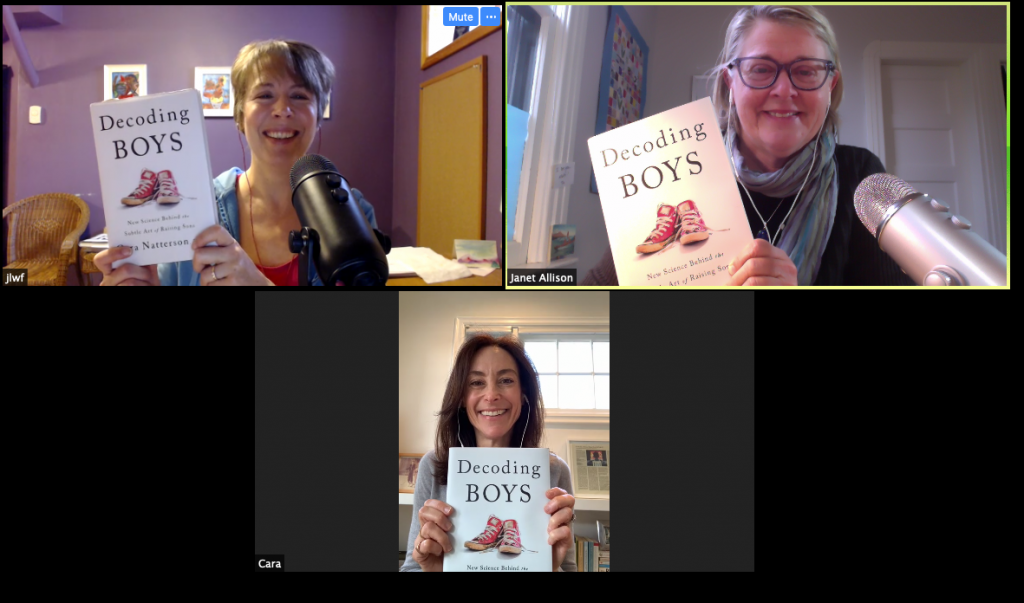Podcast: Play in new window | Download (Duration: 43:40 — 50.0MB)
Wouldn’t it be great if boys came with a magic decoder ring to help you decode their mysteries and moods?
Dr. Cara Natterson’s book, Decoding Boys: New Science Behind the Subtle Art of Raising Sons, is the next best thing. If you have boys, you’ll want to add this one to your bookshelf (or check it out from your library) right now — and you’ll definitely want to read it before your son hits puberty. Which may come a lot sooner than you expected.
According to Dr. Natterson — a pediatrician, mom of two and author of Guy Stuff: The Body Book for Boys — the first changes of puberty can begin as early as age 9. But because those early changes are largely invisible to parents’ eyes, we may misunderstand our boys’ mood swings and behavior. And because our culture has long ignored male puberty, many of us simply allow our boys to self-isolate behind closed doors, instead of talking to them about the changes they’re experiencing.
That’s a mistake, Dr. Natterson says:
Not talking to your son about his evolving physical, emotional and social self is the biggest parent trap of them all.
Kids, she’s learned, are hungry for information. “They will take good information and run with it,” Dr. Natterson says. “If we just tell them no and don’t give them the why, they don’t listen.”
But while girls have been encouraged to share their voices, opinions and experiences in recent years, boys…haven’t. Historically, “neither boys nor their parents nor the world around them” has expressed a willingness to talk frankly about erections, voice changes and body image, Dr. Natterson says. She argues that it’s time for parents to push past their discomfort and engage boys in conversation.
“There isn’t one perfect way to do this,” she says. “My best advice is, it’s not one conversation; it’s thousands. It’s many, many conversations over many years, so you have lots of opportunities to try it many different ways.”
In this episode, Jen, Janet & Cara discuss:
- Why it’s OK to let your teen boys sleep late
- What the coronavirus crisis and shutdowns are teaching us about kids’ physical and emotional needs
- The difference between making kids do something vs. educating them
- Why boys go quiet around puberty
- Getting boys to talk
- Late-blooming boys
- Brain development during adolescence (a.k.a, why boys can be so smart and so dumb, at the same time!)
- Why boys take more risks when surrounded by friends
- Boys, body image & eating disorders
- How to tell if your son’s fixation on fitness is healthy or harmful
Links we mentioned (or should have) in this episode:
Decoding Boys: New Science Behind the Subtle Art of Raising Sons — Cara’s book
worryproofmd.com — Dr. Natterson’s online home; includes a link to her newsletter
Guy Stuff: The Body Book for Boys — one of Cara’s puberty book for boys
LIKE THIS EPISODE? Share it with your friends (and thanks!):
Twitter: Use this link
Facebook: Use this link
Linkedin: Use this link
STAY CONNECTED WITH JANET & JEN:
Join the Building Boys FB group and the Boys Alive! FB group
Be sure to opt-in at Boys Alive! .com for your free report “3 Simple Tips to CONNECT with Your Boy.” And opt-in at BuildingBoys.net, too!
Follow us on Instagram: @on.boys.podcast and @boys.alive
Twitter: @ParentAdvisor and @BuildingBoys
LinkedIn: use this link for Janet and use this link for Jennifer
